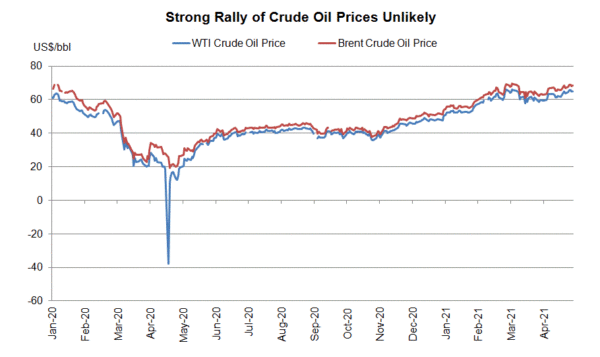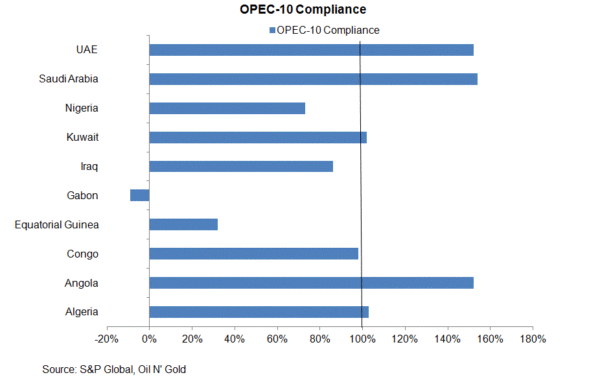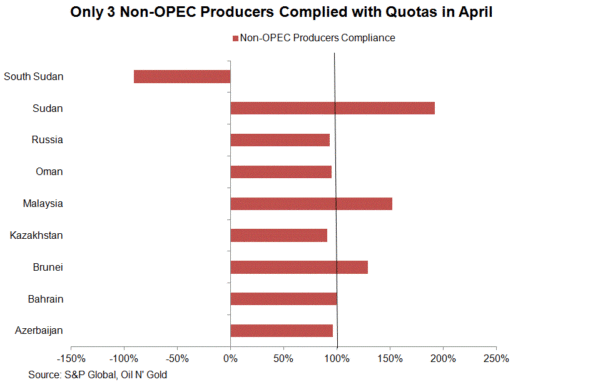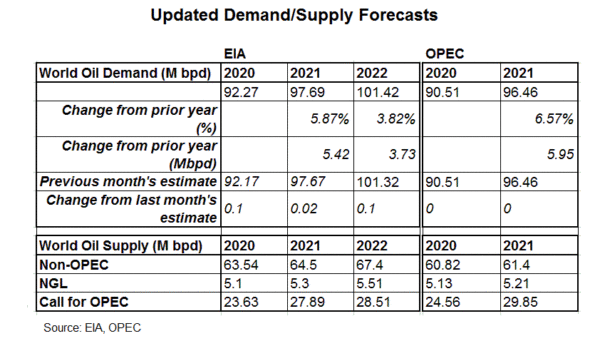Oil output from OPEC-10 and the nine non-OPEC producers joined the “output-cut” deal increased to 34.43M bpd in April, up from 34.26M bpd a month ago. The total compliance level slipped -0.2 ppt to 111%. Saudi Arabia’s voluntary cut of 1M bpd continued to contribute significantly to overall compliance. The compliance level would have dropped to 96%, the lowest since July 2020, without such reduction. Adding the three OPEC members exempted from output cut, total OPEC+ output expanded +0.21M bpd to 38.49M bpd. In particular, Iran continued to ramp up output. More oil is scheduled to enter the market from May onward, as the alliance has pledged to increase output. Less concern about deficit in the market could put a lid to oil price rally.
OPEC+ Compliance Slipped in April
OPEC-10 produced 21.22M bpd in April, up +0.04M bpd from a month ago. This, however, remained below the quota of 22.12M bpd. The cartel achieved a compliance level of 120%, compared with 120.57% in March. The chart below shows that about half of the OPEC members in the deal produced more than their assigned quotas. This was, however, offset by higher-than-required output cuts by Saudi Arabia, UAE and Angola, etc. Saudi, the largest OPEC producer, produced 8.11M bpd in April, compared with its quota of 9.12M bpd. The Kingdom has planned to rewind it voluntary cut from May to July, bringing back to entire 1M bpd output to the market by August.
Non-OPEC producers produced a total of 13.21M bpd in April, up from +13.08 a month. This also exceeded the aggregate quota of 12.93M bpd, resulting in a compliance of 86%. Russia produced 9.5M bpd in April, up +0.16M bpd from a month ago. Again, the output exceeded the quota of 9.25M bpd, resulting in a compliance level of only 93%.
Among OPEC members exempted from the deal, Iran accelerated output to 2.43M bpd, highest since May 2019. This came despite ongoing sanction from the US. It is expected that the country is on the way to return to normal output of about 4M bpd, should nuclear deal with the US and other Western powers succeed. The Middle East producer has also secured a steady customer in China.
Growth in Global Oil Demand to Accelerate in 2H21
Major oil agencies remain upbeat about the world oil demand outlook. The US Energy Information Agency (EIA) in its latest report upgraded the global demand forecast for 2020-2022. Demand this year is expected to increase to 97.69M bpd, up +5.42M bpd from a year ago and +0.02M bpd from April’s estimate. Since the EIA also revised higher 2020’s demand, the annual growth is thus trimmed slightly. Demand will expand further, by +3.73M bpd, to 101.42M bpd in 2022. The growth outlook hinges on the assumptions of continuing economic growth and increasing mobility with easing COVID-19-related restrictions. On the supply side, non-OPEC production would increase to 64.5M bpd this year, from 63.54M bpd a year ago. Supply will further increase to 57.4M bpd in 2022. Demand for OPEC output would thus increase to 27.89M bpd and 28.51M bpd in 2021 and 2022, respectively.
In OPEC’s latest report, the cartel left its global oil demand forecasts unchanged from a month ago. Demand is expected to increase to 96.46M bpd this year, from 90.51M bpd a year ago. Yet, the cartel actually revised lower demand in the first half of the year, driven by “slower than anticipated demand in OECD Americas during 1Q21” and “the resurgence of COVID-19 cases in India and Brazil”. The weakness would be offset by the strong recovery in the second half, thanks to “positive transportation fuel data from the US, and acceleration in vaccination programs in many regions”. On the supply side, non-OPEC production is expected to increase to 61.4M bpd this year, from 60.82M bpd in 2020. Call for OPEC production is projected to be 29.85M bpd this year.  Although both the EIA and the OPEC have maintained relatively upbeat demand outlooks, the demand growth would largely be sufficiently met by the potential increase in OPEC and non-OPEC producers. The demand/supply outlook would largely be balanced in coming years, offering little room for further strong rally in crude oil prices.
Although both the EIA and the OPEC have maintained relatively upbeat demand outlooks, the demand growth would largely be sufficiently met by the potential increase in OPEC and non-OPEC producers. The demand/supply outlook would largely be balanced in coming years, offering little room for further strong rally in crude oil prices.
